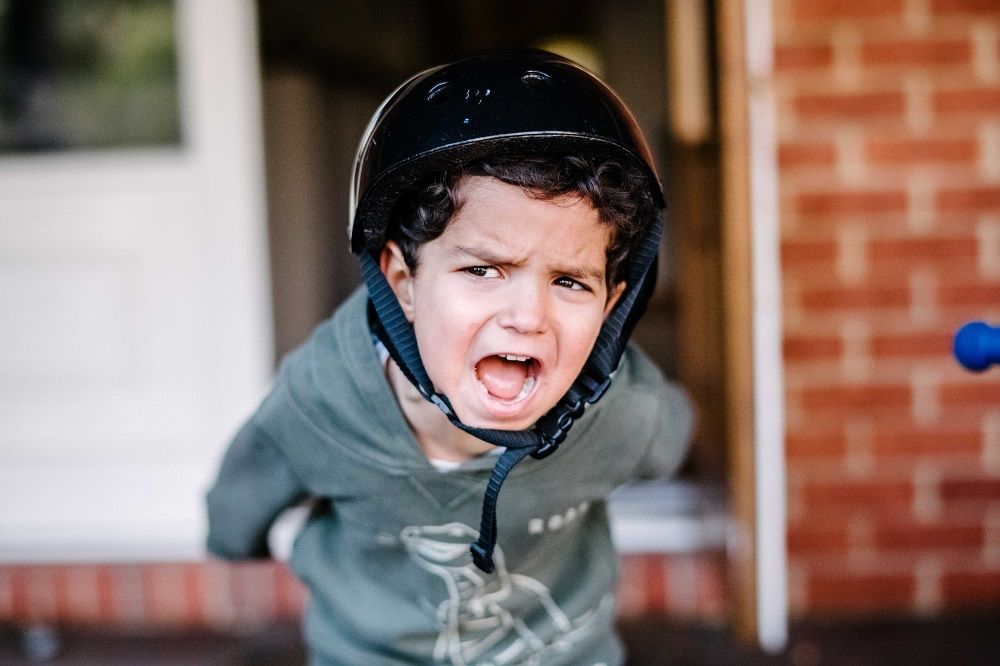How To Discipline Your Kids
Key points:
- Discipline is about helping your kids learn to behave. It’s not the same as ‘punishment’.
- You may need to adjust your discipline techniques as your child gets older.
- The best way to discipline your child is to reward positive behavior enthusiastically, but respond to misbehavior in a boring, quiet and predictable way.
When it comes to disciplining your kids, there’s a lot of dodgy advice out there. It’s a minefield really. So if you find yourself about to join a private Facebook group on parenting, prepare yourself for a whole lot of conflicting views. Try to tune out unhelpful comments from your parents, in-laws or friends too. And definitely ignore what that judgy person at the supermarket says.
Discipline isn’t just about ‘correcting’ specific bad habits. It’s the process of teaching your children about acceptable behaviors, limits and consequences. That’s right – it’s a learning process. It doesn’t happen overnight and you’re not a ‘bad parent’ if your kid acts up sometimes. You’re just doing your job.
Using evidence-based discipline techniques like the ones we explore below can help improve your child’s behavior while strengthening your relationship with them. (Ha! Take that, supermarket jerk.)
Effective discipline techniques by age
It’s also a good time to reassess your own behavior – how you react when you’re feeling frustrated, angry or upset and what example you’re setting for this very observant little person.
Here are some tips for managing your child’s discipline techniques as they get older.
Discipline for toddlers
You’ll probably relate to this meme that circulates regularly in the parenting community:
I have a question about toddlers. My question is ‘What the f*ck’?
Toddler behavior can be frustrating and quite frankly ridiculous. We’re talking full blown tantrums about having to put clothes on (though, after getting used to working from home, this one starts to feel a little more understandable). At this age, your child doesn’t understand why it’s ridiculous behavior. They’re highly swayed by their emotions, which can change minute-by-minute. But that doesn’t mean you’re powerless against toddler antics.
Try to set up your behavior management strategies now. Keep your response to misbehavior predictable, boring and low-key. This may require lots of deep breaths, happy place visualizations and (if safe to do so) just walking out of the room to collect yourself.
Some useful ways to prevent or respond to toddler misbehavior include:
- Reducing stressful stimulation. For example, you can set up a play area, where you can see what your toddler is up to but they aren’t distracted by everything else going on in the house.
- Showing your child the correct behavior (e.g., how to pat the dog gently, not pull its ears) and then giving specific praise.
- Planning ahead for challenging situations (i.e. preparing an activity or snacks for your toddler while you go grocery shopping, so they don’t get bored).
- Introducing a brief time-out for behaviors such as aggression from around two years old.
As overwhelming as it can be trying to keep your cool while your toddler wreaks havoc, try and avoid overly emotional responses to their behavior. Save it for when they’re being good.
Discipline for preschoolers
From about age three your child will start to learn which behaviors are acceptable and which are not. They’ll also inevitably try to push the boundaries.
Preschoolers will still need support in regulating their emotions and developing their social skills. Some ways you can help them include:
- Encouraging them to identify, name, and respond to their feelings.
- Teaching them about empathy and how their actions make others feel.
- Reading books or watching age-appropriate TV shows about managing emotions.
- Modeling good communication and conflict resolution skills yourself.

Discipline for school aged kids
School aged children should understand behavior expectations, but may need reminding from time to time. New challenges may arise as your kids move into school as well. It’s worth checking in with your child’s teacher regularly to chat about any areas of concern with their behavior.
Encourage positive behavior by:
- Actively catching them in the act of being good and rewarding them with praise and affection.
- Engaging your child in household tasks, such as setting the table for mealtimes.
- Encouraging problem solving when conflicts arise, such as sibling arguments.
Don’t be afraid to reach out for professional help if you’re struggling with your child’s behavior. There could be something else going on with them or you may just need a little parenting confidence boost yourself. We all need it sometimes.
Discipline for teenagers
As your kids grow into teenagers (where did that time even go?), their needs will change and so their behaviors probably will too. Some families may need to adjust rules (for example, extending screen time or pushing bedtime back), but it’s as important as ever to establish clear behavior expectations and use consequences if they aren’t met.
You probably don’t need reminding about the strange, hormone-charged, emotional awkwardness that is being a teenager. Kids at this age are often developing a sense of independence and identity. They might push the boundaries of what’s allowed.
Help your teen deal with this weird time and keep their behavior on track by:
- Encouraging them to name and understand their emotions.
- Prompting them to solve problems on their own.
- Ensuring they’re getting enough sleep, exercise, and nutrition.
- Spending quality time with them. As ‘uncool’ as it may be for them to hang out with you, show an interest in their lives and they’ll be more likely to open up.
It’s a tough balance in the teenage years. While you want to assert the rules, you don’t want to overdo it on the discipline front and alienate your child. Try to strike a good middle ground and keep your response to misbehavior consistent. While teens can really push your buttons and rile you up, remember that they still need guidance and level-headed responses from you.
Is it bad to smack kids?
Perhaps you grew up with your parents giving you a smack when you acted out. And you turned out okay so it can’t be too harmful, right?
Disciplining your kids is shown to be most effective when your response involves minimal attention, excitement and physical contact. You want it to be as boring and predictable as possible, so hitting or smacking won’t help the situation. You may even find that if you smack your kids they will use physical aggression with others as a way of dealing with their problems. So this response can actually make things worse.
Plus, an overly emotional response is often the result of your own emotions. When you’re angry and overwhelmed you may want to release this tension by hitting or yelling. If you feel that temptation coming on, take a few deep breaths or even leave the room if it’s safe to do so. Misbehavior should be dealt with when you’re on top of your emotions. Remember that the time-out strategy (for younger children) is a technique that helps parents to stay calm as well as helping kids learn to control their emotions. If you struggle to stay cool when disciplining your child, consider seeing a psychologist or getting some help with this.
Remember, a lot of your kids’ behaviors are learned from you. By responding to misbehavior with aggression or physical punishment, you’re essentially telling them that it’s okay to hit and yell. Which is kind of not the point here and will probably end up with them doing the same at daycare or school.

Is it bad to punish children?
A lot of people equate ‘discipline’ with ‘punishment’. But they’re not the same thing. Discipline is about helping your children learn how to behave, whereas punishment is a negative consequence that aims to deter certain behavior.
Discipline led by encouraging positive behavior is much more effective than punishing misbehavior. Research suggests that techniques like time-out, when used correctly, help kids build self-control and manage their emotions on their own. Having a strategy in place for managing behavior can help you stay calm and avoid resorting to punishments.
Best ways to discipline children
Experts agree that the following tips can help you nail this discipline thing.
- Keep it boring, predictable and unemotional.
- Use time-out to help kids calm down.
- Spend lots of time-in. This means lots of praise and quality time. Daily quality time will give your kids the attention they crave.
- After discipline, don’t talk about the misbehavior or demand an apology. This just means you're focusing on the negative longer, it’s better to just get back to encouraging positive behavior.
- Focus on encouraging positive behavior (more than you focus on negative behavior).
- Set clear family rules.
- Follow regular routines.
- Plan ahead for challenging situations.
- Try to regulate your own emotions when disciplining your kids.
- Respond quickly to misbehavior and don’t let it escalate. This way you are more likely to stay calm while disciplining.
- Model the sort of behavior you want to see.
While you may hear lots of views and opinions on the right way to discipline your children (more often than not unwelcome), have confidence in your approach. Staying calm and consistent is half the battle. Once you’ve nailed that, it’s about shifting the focus to actively notice positive behavior. Respond to this in excited, emotional and unexpected ways (Dancing! Ice cream! Cuddles! Attention!). And when it comes to the tough side of parenting (disciplining bad behavior) deal with it quickly, quietly and predictably — so that everyone can get back to the fun stuff.
Want to learn more?
Movember launched Family Man to improve the confidence and mental health of dads.
Learn how to master kick-ass parenting strategies by getting started with Family Man. It’s an interactive parenting video series that's expert-backed and funded by Movember.
If research is your thing take a closer look at the evidence behind Family Man.
Or learn more before diving in.